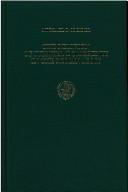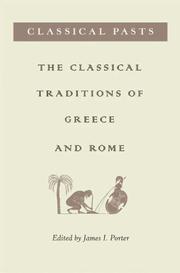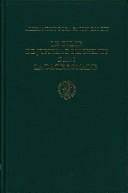| Listing 1 - 9 of 9 |
Sort by
|

ISBN: 9004076654 9004295747 9789004076655 Year: 1987 Volume: 106 Publisher: Leiden: Brill,
Abstract | Keywords | Export | Availability | Bookmark
 Loading...
Loading...Choose an application
- Reference Manager
- EndNote
- RefWorks (Direct export to RefWorks)
Jupiter (Roman deity) in art --- Sculpture, Classical --- Jupiter (Divinité romaine) dans l'art --- Sculpture antique --- Catalogs --- Catalogues --- Jupiter Dolichenus (Roman deity) --- Cult --- Art --- Jupiter Dolichenus --- -Jupiter Dolichenus --- -Jupiter Dolichenus (Roman deity) --- -292.211 --- 016.733 --- Gods, Roman --- -Catalogs --- Religion Classical Greek and Roman Gods, goddesses, divinities and deities --- General Bibliographies and catalogs Greek, Etruscan, Roman sculpture --- Catalogs. --- Jupiter (Divinité romaine) dans l'art --- 292.211 --- Art&delete& --- Cult&delete& --- Jupiter Dolichenus. Culte. --- Jupiter Dolichenus. Eredienst. --- Jupiter --- Jupiter Dolichenus (Roman deity) - Cult - Catalogs --- Jupiter Dolichenus (Roman deity) - Art - Catalogs
Book
Year: 1852 Publisher: Bonn : Gedruckt auf Kosten des Vereines,
Abstract | Keywords | Export | Availability | Bookmark
 Loading...
Loading...Choose an application
- Reference Manager
- EndNote
- RefWorks (Direct export to RefWorks)
Book
ISBN: 9783774932401 3774932409 Year: 2004 Publisher: Bonn : Habelt,
Abstract | Keywords | Export | Availability | Bookmark
 Loading...
Loading...Choose an application
- Reference Manager
- EndNote
- RefWorks (Direct export to RefWorks)
Mithraism --- Mithras (Zoroastrian deity) --- Jupiter Dolichenus (Roman deity) --- Mithracisme --- Mithra (Divinité zoroastrienne) --- Dolichenus (Divinité romaine) --- Dülük (Turkey) --- Dülük (Turquie) --- Religion. --- Antiquities. --- Religion --- Antiquités --- Mithra (Divinité zoroastrienne) --- Dolichenus (Divinité romaine) --- Dülük (Turkey) --- Dülük (Turquie) --- Antiquités --- Mithra (Zoroastrian deity) --- Zoroastrian gods --- Zoroastrianism --- Gods, Roman --- Doliche (Turkey) --- Mithras (Zoroastrian deity). --- Jupiter Dolichenus (Roman deity).

ISBN: 9004053980 9004295348 9789004053984 Year: 1978 Volume: 63 Publisher: Leiden: Brill,
Abstract | Keywords | Export | Availability | Bookmark
 Loading...
Loading...Choose an application
- Reference Manager
- EndNote
- RefWorks (Direct export to RefWorks)
Dolichenus --- Cult --- Rome --- Army --- Religious life --- Armée --- Vie religieuse --- Jupiter Dolichenus (Roman deity) --- 292.07 --- Religion Classical Roman --- -Cult --- -Religious life. --- Cult. --- Armée --- Gods, Roman --- Religious life. --- Jupiter Dolichenus (Roman deity) - Cult --- Rome - Army - Religious life --- Armed Forces --- Rome (Empire) --- Rim --- Roman Empire --- Roman Republic --- Romi (Empire) --- Italy --- Byzantine Empire
Book
ISBN: 9783161517976 3161517970 Year: 2012 Volume: 8 Publisher: Tübingen: Mohr Siebeck,
Abstract | Keywords | Export | Availability | Bookmark
 Loading...
Loading...Choose an application
- Reference Manager
- EndNote
- RefWorks (Direct export to RefWorks)
Jupiter Dolichenus (Roman deity) --- Dolichenus (Divinité romaine) --- Rome --- Religion --- 292.2 --- Godsdiensten van de Romeinen --- Religious life and customs --- Conferences - Meetings --- 292.2 Godsdiensten van de Romeinen --- Dolichenus (Divinité romaine) --- Cults --- Cults. --- Dolichenus-Kult. --- Cult --- Cult. --- Rome (Empire). --- Gods, Roman --- Alternative religious movements --- Cultus --- Marginal religious movements --- New religions --- New religious movements --- NRMs (Religion) --- Religious movements, Alternative --- Religious movements, Marginal --- Religious movements, New --- Religions --- Sects --- Rim --- Roman Empire --- Roman Republic (510-30 B.C.) --- Romi (Empire) --- Byzantine Empire --- Rome (Italy) --- Jupiter Dolichenus (Roman deity) - Cult - Congresses --- Cults - Rome - Congresses --- Rome - Religious life and customs - Congresses
Book
ISBN: 9783161547300 3161547306 Year: 2017 Publisher: Tübingen : Mohr Siebeck,
Abstract | Keywords | Export | Availability | Bookmark
 Loading...
Loading...Choose an application
- Reference Manager
- EndNote
- RefWorks (Direct export to RefWorks)
Jupiter Dolichenus (Roman deity) --- Mithra (Zoroastrian deity) --- Zoroastrian gods --- Isis --- 295 Parsisme. Zoroastrisme. Mazdéisme. Mithriacisme --- 295 Perzische godsdiensten --- Parsisme. Zoroastrisme. Mazdéisme. Mithriacisme --- Perzische godsdiensten --- Mithras (Zoroastrian deity) --- Cult --- Rome --- Religion --- History --- 295 --- 292.2 --- Gods, Roman --- Mithraism --- 292.2 Godsdiensten van de Romeinen --- Godsdiensten van de Romeinen --- Rim --- Roman Empire --- Roman Republic (510-30 B.C.) --- Romi (Empire) --- Byzantine Empire --- Rome (Italy) --- Cult. --- Aset --- Eset --- Iset --- İsida --- Isidi --- Izida --- Iziso --- Iside --- Izidė --- Ízisz --- Izyda --- 伊西斯 --- Yi xi si --- イシス --- Ishisu --- איזיס --- 이시스 --- Isiseu --- Исида --- Изида --- Ісіда --- إيزيس --- Īzīs --- Ἴσις --- History.

ISBN: 0691089418 0691089426 0691225397 Year: 2006
Abstract | Keywords | Export | Availability | Bookmark
 Loading...
Loading...Choose an application
- Reference Manager
- EndNote
- RefWorks (Direct export to RefWorks)
The term "classical" is used to describe everything from the poems of Homer to entire periods of Greek and Roman antiquity. But just how did the concept evolve? This collection of essays by leading classics scholars from the United States and Europe challenges the limits of the current understanding of the term. The book seeks not to arrive at a final definition, but rather to provide a cultural history of the concept by exploring how the meanings of "classical" have been created, recreated, and rejected over time. The book asks questions that have been nearly absent from the scholarly literature. Does "classical" refer to a specific period of history or to the artistic products of that time? How has its definition changed? Did those who lived in classical times have some understanding of what the term "classical" has meant? How coherent, consistent, or even justified is the term? The book's introduction provides a generous theoretical and historical overview. It is followed by eleven chapters in which the contributors argue for the existence not of a single classical past, but of multiple, competing classical pasts. The essays address a broad range of topics--Homer and early Greek poetry and music, Isocrate, Hellenistic and Roman art, Cicero and Greek philosophy, the history of Latin literature, imperial Greek literature, and more. The most up-to-date and challenging treatment of the topic available, this collection will be of lasting interest to students and scholars of ancient and modern literature, art, and cultural history.
Beschaving [Grieks-Romeinse ] --- Civilisation gréco-romaine --- Civilization [Greco-Roman ] --- Cultuur [Grieks-Romeinse ] --- Greco-Roman civilization --- Grieks-Romeinse beschaving --- Grieks-Romeinse cultuur --- Civilization, Greco-Roman. --- Civilization, Greco-Roman --- Civilization, Classical --- klasszika-filológia --- klasszikus irodalom --- művészettörténet --- tanulmányok --- Academy. --- Achaemenids. --- Acusilaus of Argos. --- Alcamenes. --- Antinoopolis. --- Athenocentrism. --- Bacchylides. --- Boeotia. --- Bronze Age. --- Caecilius. --- Callimachus. --- Cato. --- Corinthian classicism. --- Dionysius. --- Domitian. --- Empedocles. --- Ennius. --- Epicureanism. --- Gorgias. --- Hadrian. --- Hellenism. --- Hera Teleia. --- Horace. --- Italic art. --- Jesus. --- Jupiter Dolichenus. --- Justinian. --- Laevius. --- Latin. --- Livius Andronicus. --- Lucian. --- Lycurgus. --- Lysias. --- Maecenas. --- Martial. --- Oppian. --- Osiris. --- classicus. --- cultural memory. --- democracy. --- emotion. --- euphonism. --- historical distance. --- historical narrative. --- humanism. --- ideology. --- imperialism. --- modernity. --- monuments. --- mythography. --- naturalism. --- neoteric literature. --- orality. --- oratory.

ISBN: 9004054510 9004295461 9789004054516 9789004295469 Year: 1978 Volume: 69 Publisher: Leiden: Brill,
Abstract | Keywords | Export | Availability | Bookmark
 Loading...
Loading...Choose an application
- Reference Manager
- EndNote
- RefWorks (Direct export to RefWorks)
Jupiter (Roman deity) --- Romans --- Jupiter (Divinité romaine) --- Cult --- Religion --- Culte --- Dacia --- Dacie --- Jupiter Dolichenus (Roman deity) --- -292.211 --- Ethnology --- Italic peoples --- Latini (Italic people) --- Religion Classical Greek and Roman Gods, goddesses, divinities and deities --- -Cult --- -Religion --- Cult. --- Religion. --- Jupiter (Divinité romaine) --- 292.211 --- Gods, Roman --- Dolichenus (Divinité romaine) --- Religion, Primitive --- Atheism --- Irreligion --- Religions --- Theology --- Europe --- Romania. --- Government of Romania --- Lo-ma-ni-ya --- Luomaniya --- R.N.R. --- R.P.R. --- R.P. Romîn --- R.S.R. --- Republica Populară Romîn --- Republica Socialistă România --- Rhowmenia --- RNR --- Román Szocialista Köztársaság --- Romāniy --- Romanyah --- Roumania --- Roumanie --- RP Romîn --- RPR --- RSR --- Rumania --- Rumänien --- Rumenyah --- Rumenye --- Rumunia --- Rumŭnii͡ --- Rumunsko --- Rumynii͡ --- Rumynskai͡a Narodnai͡a Respublika --- Romania --- R.P. Romînă --- Republica Populară Romînă --- Romāniyā --- RP Romînă --- Rumŭnii︠a︡ --- Rumynii︠a︡ --- Rumynskai︠a︡ Narodnai︠a︡ Respublika --- R.P. RomiÌnaÌ --- Republica PopularaÌ RomiÌnaÌ --- Republica SocialistaÌ RomaÌnia --- RomaÌn Szocialista KoÌztaÌrsasaÌg --- RomaÌniyaÌ --- RP RomiÌnaÌ --- RumaÌnien --- RumuÌniiï¸ a︡ --- Rumyniiï¸ a︡ --- Rumynskaiï¸ a︡ Narodnaiï¸ a︡ Respublika --- Jupiter Dolichenus (Roman deity) - Cult --- Dacia - Religion
Book
ISBN: 9780198703723 0198703724 1306947979 0191774065 0191015040 9780191015045 9780191774065 Year: 2014 Publisher: Oxford
Abstract | Keywords | Export | Availability | Bookmark
 Loading...
Loading...Choose an application
- Reference Manager
- EndNote
- RefWorks (Direct export to RefWorks)
Emerging from a decade of research, 'From Jupiter to Christ' demonstrates that the decisive change within the Roman imperial period was not a growing number of religions or changes in their ranking and success, but a modification of the idea of 'religion' and a change in the social place of religious practices and beliefs.
292.2 --- Godsdiensten van de Romeinen --- Jupiter (Roman deity). --- Religion. --- Godsdiensten. --- Cultus. --- Jesus Christ. --- Jupiter, --- Rome --- Rome (Empire). --- Romeinse rijk. --- 292.2 Godsdiensten van de Romeinen --- Godsdienst. --- Jupiter Dolichenus (Roman deity) --- Jupiter --- Gods, Roman --- Jesus Christ --- Christ --- Cristo --- Jezus Chrystus --- Jesus Cristo --- Jesus, --- Christ, Jesus --- Yeh-su --- Masīḥ --- Khristos --- Gesù --- Christo --- Yeshua --- Chrystus --- Gesú Cristo --- Ježíš --- Isa, --- Nabi Isa --- Isa Al-Masih --- Al-Masih, Isa --- Masih, Isa Al --- -Jesus, --- Jesucristo --- Yesu --- Yeh-su Chi-tu --- Iēsous --- Iēsous Christos --- Iēsous, --- Kʻristos --- Hisus Kʻristos --- Christos --- Jesuo --- Yeshuʻa ben Yosef --- Yeshua ben Yoseph --- Iisus --- Iisus Khristos --- Jeschua ben Joseph --- Ieso Kriʻste --- Yesus --- Kristus --- ישו --- ישו הנוצרי --- ישו הנצרי --- ישוע --- ישוע בן יוסף --- المسيح --- مسيح --- يسوع المسيح --- 耶稣 --- 耶稣基督 --- 예수그리스도 --- Jíizis --- Yéshoua --- Iėsu̇s --- Khrist Iėsu̇s --- عيسىٰ --- Iuppiter --- Iovis --- Jove --- Chupiter --- Yupiter --- Юпітэр --- I︠U︡pitėr --- Юпитер --- Yaou --- Iau --- Γιούπιτερ --- Gioupiter --- Jupitero --- Xúpiter --- Giove --- יופיטר --- Yow --- Jupiters --- Jupiteris --- Јупитер --- Ġove --- Jowisz --- Giovi --- Juppiter --- Hupiter --- Юпітер --- 朱庇特 --- Zhubite --- Zhu bi te --- Jupiter Optimus Maximus --- Júpiter Óptimo Máximo --- Diespiter --- Lucetius --- Jupiter Elicius --- Jupiter Fulgur --- Zeus
| Listing 1 - 9 of 9 |
Sort by
|

 Search
Search Feedback
Feedback About UniCat
About UniCat  Help
Help News
News